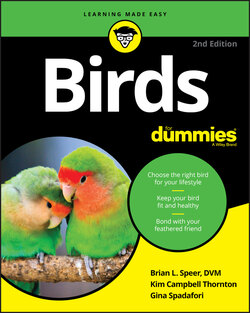Читать книгу Birds For Dummies - Gina Spadafori - Страница 18
CLOUD: A THERAPY BIRD
ОглавлениеOur flying friends can be much more than companions in our homes. Birds have made a place for themselves as our helpers as well. Pet birds help children with autism improve their social skills, gain self-confidence, and develop trust. Parrots have helped people with disabilities manage stress and anxiety. Some emotional support parrots have learned to recognize stress in their humans and to say calming phrases that help them to relax or overcome anger. And although they aren’t as common as therapy dogs or cats, therapy birds bring joy to patients in hospitals, residents of nursing homes, and children in schools.
Cloud, a ringneck dove (shown in the nearby photograph), was handled by humans — including kids — from the time he cracked out of his shell. He grew up to be a docile, friendly bird who was especially used to interacting with children. His owner, Daleen Comer, was involved in pet therapy visits, and she thought Cloud would be a natural for the children’s reading program. She trained him to wear a flight suit (think of it as a bird diaper) and created a special basket in which he could ride and be secure. To help prepare him for making visits, she began taking him places: the bank, the dry cleaner, the pet store, hobby shops. He wasn’t afraid of anything. When Cloud was 2 years old, she had him evaluated by Pet Partners to see if he was suited to the work, and he received a perfect score.
They started making visits to the library and then weekly visits to classrooms. Cloud, now 12 years old, sits on his blanket on a table at school. Kids take turns coming up to see him, give him a treat, and read to him to practice their skills with a noncritical listener. He attends programs where students learn about the differences between therapy animals and service animals and demonstrates how therapy animals can help people. College students at exam time also benefit from his stress-relieving presence. Comer says Cloud is an ideal partner for the communities in which they visit and hopes he has several more years of bringing happiness to people.
Photograph courtesy of Daleen Comer
Socialized since infancy to see humans as part of their “flock,” many of today’s pet birds have companionship potential that can amaze anyone who believes the old stereotypes about wild-caught birds. Every bit as beautiful as their wild relatives, breeder-raised babies are loving and intelligent, and improvements in what we know about their care keep them healthier than ever before. Our newfound knowledge, combined with centuries of experience and perspective, means that if you educate yourself to care for your pet, you can expect a phenomenal relationship — better than you may have imagined when you decided to become a bird owner. The depth of a healthy and interactive relationship with another living being is immense. Birds can certainly be a part of our lives and we a part of theirs.
